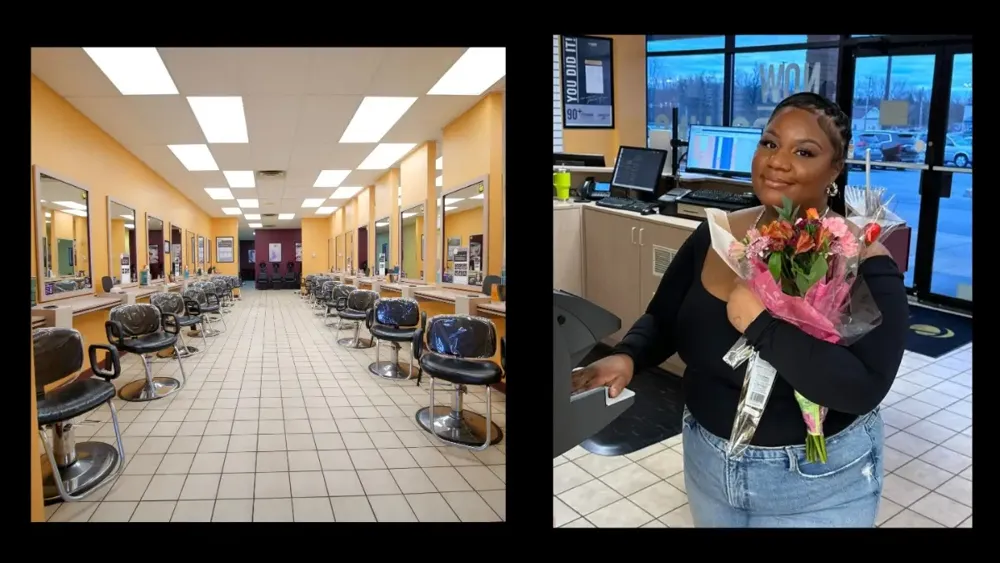‘Shouted Racial Slurs’: Black Woman Sues After Beauty School Dismisses Harassment as ‘Involuntary’ Tics from Student with Tourette’s

A Black cosmetologist training to be an educator at a beauty school in Lebanon, Pennsylvania, is suing the school’s parent company, claiming it did nothing to stop racial harassment by a female classmate student with Tourette syndrome. Yamonnie Pressley says soon after enrolling in Empire Beauty School in June her classmate (referred to as Student A in her federal lawsuit obtained by Atlanta Black Star) followed her around the school building and "repeatedly shouted racial slurs" at her whenever she saw Pressley, causing her to feel threatened. The educator program at the school consists of classroom instruction and hands-on learning experiences, and Pressley claims she was verbally harassed with such frequency by Student A that she was unable to attend required in-person classroom observations from July to September. Yamonnie Pressley (right) graduated from Empire Beauty School in Lebanon, Pennsylvania (left) in January 2024 with a certificate in cosmetology. (Photo: Empire Beauty School/Lebanon Facebook Page) When Pressley reported the harassment to school management and let them know it was negatively impacting her ability to complete her program requirements, the school's management allegedly told her that there was nothing they could do because the student’s actions were involuntary. Tourette syndrome is a neurological disorder that may cause sudden unwanted and uncontrolled rapid and repeated movements or vocal sounds called tics, according to the National Institutes of Health. A small subset of people with Tourette (about 10 percent) display complex tics involving vocal outbursts using vulgar, obscene, or swear words, symptomology called coprolalia. Student A seemed to have this Tourette characteristic, the complaint says. ‘Humiliated’: Black Woman Wrongly Jailed for Three Days After Deputies Arrested Her Instead of White Suspect Solved Her Own Case to Get Out Pressley’s lawsuit asserts that the school is not required by the federal Americans With Disabilities Act (ADA) “to accommodate Student A’s apparent disability at the expense of Pressley’s right to be free from discrimination based on race.” It also notes that the offending student’s actions clearly and directly violated the school’s own nondiscrimination policy statement, which prohibits racial discrimination in the form of harassment. Pressley, who had obtained a cosmetology certificate from the Lebanon school in 2024, didn’t complete the educator program and contends that she suffered economic harm, including the loss of tuition payments, as well as emotional distress, embarrassment and humiliation. Her complaint alleges that defendant Empire Education Group, which owns a chain of Empire Beauty Schools across the country, was indifferent to the emotional impact the racial harassment had on Pressley and violated federal civil rights law by racially discriminating and retaliating against her. It also accuses the company of intentional and negligent infliction of emotional distress. She seeks a jury trial to determine “all available remedies and damages” and for the court to remain involved until it is satisfied that Empire Education has “remedied its illegal practices.” Attorneys for Pressley did not immediately return a request for comment from Atlanta Black Star. A spokesperson for Empire Education said they were unable to comment on any legal matters. The company had 21 days after being served on Sept. 29 to file a response to the lawsuit in U.S. District Court for the Central District of Pennsylvania. In recent years lawsuits involving litigants with Tourette syndrome who made similar vulgar and racist outbursts in educational and work settings have resolved in divergent ways. In October 2020 University of Southern Indiana (USI) student Seth Pressler, who suffers from Tourette syndrome, was forced to leave the campus after numerous incidents in which he allegedly called multiple Black students “ni—ger” and also said, “I have a gun.” His lawsuit against the university filed in 2021 said that USI’s Disability Resource Department was aware of his disorder, which often involved his making an inappropriate outburst followed by an apology explaining, “I’m sorry, that was my Tourette’s,” a measure the school’s disability coordinator advised him was appropriate when he enrolled. But within a week of his string of racist and alarming verbal tics, the university staff and its director of public safety told Pressler during a Google Team meeting that he was permanently barred from setting foot on the campus. Many students at USI were sympathetic to Pressler’s medical condition and wanted him to stay. More than 32,000 signed a petition urging the university to reconsider. "He is a kind, funny compassionate person and friend who needs to be loved like the rest of us and needs to be a part of a community that he can feel loved and appreciated by,” his friend Julia Ennis, then a senior at USI, told the Courier & Press. Ennis said she met Pressler through campus organizations and their church. "I had never interacted with anyone who had Tourette's before Seth," Ennis said. "But he is far more than his Tourette's, and he deserves for people to speak up for him and fight against this decision that was made." At the time, USI officials said they "deeply value and support diversity and inclusion for all," in a written statement to media. "As such, we appreciate the outpouring of concern and support by those commenting on the limited details provided in the petition," the statement read. "USI will always make decisions with care and concern for individuals at the forefront. To the extent that the larger campus community may be affected by an individual, the University must always consider the safety and good of the whole." Pressler struggled to continue his education remotely, the lawsuit said, alleging that he was “ostracized, confined and discriminated against based on his disability, without consideration or accommodation” and denied the same educational benefits and services as other students, in violation of federal equal protection laws. After a year of litigation, the case was dismissed after Pressler settled with the university in February of 2022 with settlement terms that were not publicly disclosed. More recently, in February 2024 the U.S. Court of Appeals for the Sixth Circuit upheld a decision by a district court that Cameron Cooper, a man with Tourette’s who worked as a delivery person for Coca-Cola Consolidated, Inc. in Tennessee and sometimes shouted obscene words to retail customers including “bi—h” and “ni—er” could not claim the company violated his disability rights when it required him to transfer to a warehouse position with no contact with customers. The Court noted that the job description of delivery merchandiser required “excellent customer service skills” and that Pressley could not do that job without offending customers. It found the company’s decision to move him to the warehouse position was not discrimination, but a reasonable accommodation.

